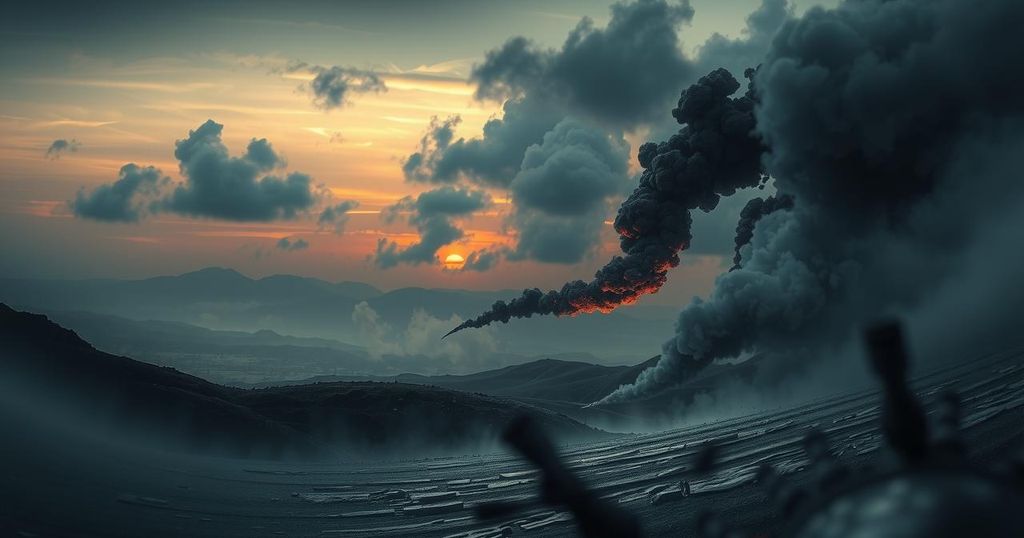Humanitarian Crisis in Goma: Rising Death Toll Amidst Conflict with M23 Rebels

Recent clashes in Goma, eastern Congo, resulted in at least 773 deaths and a humanitarian crisis as M23 rebels, allegedly supported by Rwanda, captured the city. The Congolese military is attempting to regain lost territories, while residents return amidst destruction and mourning. Human rights violations have escalated as the conflict worsens, severely impacting humanitarian operations.
In the recent escalation of violence in eastern Congo, at least 773 individuals have been reported dead in Goma and its surrounding areas due to confrontations with the M23 rebels, who are allegedly backed by Rwanda, according to Congolese officials. The Congolese government’s spokesperson, Patrick Muyaya, indicated that the numbers may be higher as many bodies may not have been accounted for, with the rebels forcing residents to clean the streets.
Following the rebel takeover, residents are returning to Goma as a semblance of order is promised, yet fear lingers amidst the destruction. Much of the city bears the scars of conflict, with reports of hundreds mourning at every corner, as illustrated by the personal tragedies faced by individuals such as Jean Marcus, who lost a relative in the turmoil.
The M23 group remains one of the most formidable armed factions within the region, fueled by ethnic tensions and supported by approximately 4,000 Rwandan troops. As fighting continues, the Congolese military is reportedly regaining control of some territories, including Sanzi, Muganzo, and Mukwidja, which had recently been seized by the rebels.
UN officials have noted the M23’s rapid advances toward strategic locations, raising concerns about potential humanitarian crises. Disturbingly, the conflict has resulted in widespread abuses, including extrajudicial killings and forced conscriptions, prompting condemnation from human rights organizations. The violent resurgence has stagnated humanitarian operations in Goma, a crucial aid hub for many displaced individuals in the region.
Recent assessments conducted by the World Health Organization reported staggering casualty figures during late January, with confirmed deaths surpassing 700. Reports indicate that both the rebel and Congolese forces have engaged in severe violations of human rights amidst the escalating violence. International organizations warn of growing humanitarian disasters as the fighting intensifies and restricts access to necessary aid.
The capture of Goma has resulted in critical implications for humanitarian access, affecting millions of displaced individuals and worsening the overall crisis. As conflicts continue to rise, aid groups, including Mercy Corps, voice concerns over the exacerbation of the situation, expressing that community support is rapidly deteriorating due to the breakdown of assistance.
Overall, the situation in Goma underscores a deepening crisis fueled by protracted conflict, highlighting the urgent need for renewed attention to humanitarian conditions and a resolution to the ongoing violence.
The article addresses the recent developments in the conflict involving the M23 rebel group in Goma, eastern Congo. This conflict has escalated significantly, causing substantial civilian casualties and resulting in a humanitarian crisis. The M23 has regained control over Goma, a city that previously served as an essential hub for humanitarian assistance for millions affected by the conflict. The involvement of external forces, particularly from Rwanda, implies a complex geopolitical layer, influencing the already volatile situation. The conflict in the eastern Democratic Republic of Congo has deep roots, driven by a mixture of ethnic tensions and competition for valuable resources. The article emphasizes the deteriorating security and humanitarian conditions as the fighting disrupts lives and communities in the region.
In conclusion, the violent confrontations between M23 rebels and the Congolese military in Goma have led to devastating casualties and a severe humanitarian crisis, impacting thousands. The ongoing conflict, fueled by external support and internal strife, continues to threaten the stability of the region. With continued violence, the international community must respond to the urgent humanitarian needs of affected populations and assist in finding a resolution to this entrenched conflict.
Original Source: www.theguardian.com








